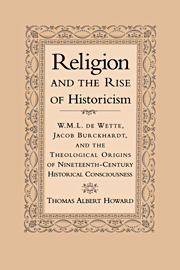 Religion and the Rise of Historicism
Religion and the Rise of Historicism Book contents
- Frontmatter
- Contents
- Acknowledgments
- Introduction: History, Theology, and Modernity
- 1 W. M. L. de Wette: Enlightenment, Romanticism, and Biblical Criticism
- 2 De Wette and Schleiermacher at Berlin (1810–1819): Politics, History, and the Post-Enlightment Transformation of Theology
- 3 De Wette, D. F. Strauss, and the New Christusbild
- 4 Basel, Burckhardt, and de Wette
- 5 History without Centaurs
- Abbreviations: Used in Notes and Bibliography
- Notes
- Bibliography
- Index
1 - W. M. L. de Wette: Enlightenment, Romanticism, and Biblical Criticism
Published online by Cambridge University Press: 02 December 2009
- Frontmatter
- Contents
- Acknowledgments
- Introduction: History, Theology, and Modernity
- 1 W. M. L. de Wette: Enlightenment, Romanticism, and Biblical Criticism
- 2 De Wette and Schleiermacher at Berlin (1810–1819): Politics, History, and the Post-Enlightment Transformation of Theology
- 3 De Wette, D. F. Strauss, and the New Christusbild
- 4 Basel, Burckhardt, and de Wette
- 5 History without Centaurs
- Abbreviations: Used in Notes and Bibliography
- Notes
- Bibliography
- Index
Summary
There we saw the giants, the sons of Anak, and we were in our own sight as grasshoppers, and so we were in their sight.
– American theologian, commenting on his impressions of German academic theology, c. 1835.In 1836, an article in the Boston Unitarian periodical, The Christian Examiner, reported to American readers the scholarly achievements of the University of Berlin founded twenty-six years earlier: “The Berlin University numbers illustrious names among its teachers and professors. Fichte, Schleiermacher, de Wette, and Hegel have laid their honors at her feet. Of these de Wette alone still survives and toils industriously at Basel to heighten the glory that already crowns his days. The exile [from Prussia], though a bold innovator is … one of the best critics and ablest writers in Germany.”
Hegel, Schleiermacher, and Fichte are names well known to students of nineteenth-century German theology and philosophy, but de Wette is not. This is curious, because de Wette's prominence in the nineteenth century, as both theologian and biblical critic, was great. In New England he was one of the most widely translated German theologians. Theodore Parker, Samuel Osgood, James Freeman Clarke, and Frederick Frothingham were all influenced by de Wette and vigorously defended his views to other New England intellectuals. De Wette was known as one of the least mystical German thinkers, as a stylist with “English pith” and clarity, and as a theologian whose ideas influenced and harmonized with those of Transcendentalism.
- Type
- Chapter
- Information
- Religion and the Rise of HistoricismW. M. L. de Wette, Jacob Burckhardt, and the Theological Origins of Nineteenth-Century Historical Consciousness, pp. 23 - 50Publisher: Cambridge University PressPrint publication year: 1999


